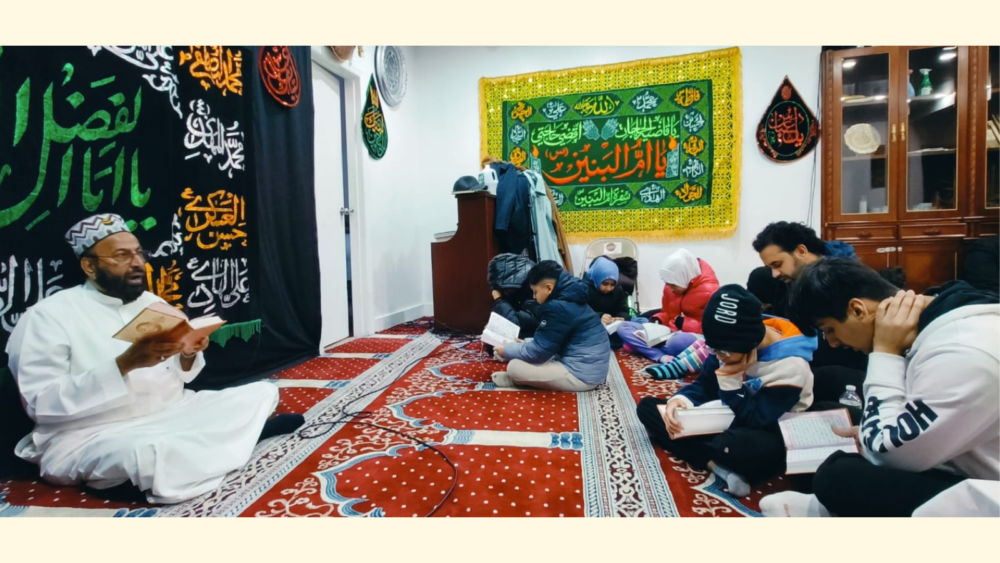
NEW YORK — A children’s quiz is on, in full swing. A dozen or so kids are seated on the floor in a semicircle in front of the quizmaster, answering his questions with aplomb. The rapid-fire questions, however, are not about current affairs or state capitals. Instead, they are about the names of revered imams and types of Muslim prayers.
It’s Sunday school at the Al-Mahdi Foundation mosque on Brooklyn’s Coney Island Avenue, and the children are being quizzed about their knowledge of Islam and Shia history.
They are asked to name the five pillars of Islam. “Who will count them for me?” enquires the quizmaster, Dr. Sakhawat Hussain, the founder of the Al-Mahdi Foundation. The children are eager to respond.
Nine-year-old Syed Mujtaba Haider says this is what he likes most about Sunday school at the masjid. She is particularly fond of the imam, whom she calls Maulana, meaning a learned Muslim scholar. “It’s fun, reading the Koran and answering Maulana’s questions. So, you can have more knowledge,” says the fourth-grader, rather knowledgeably.
Ameer Qaim Raza is a year older than Mujtaba. He’s come all the way from Staten Island. Why make the trip to Brooklyn every Sunday? “Because I get to see my friends and we get to read the Koran,” he says.
The quiz continues. “What is the meaning of roza?” “Fasting,” answer the kids. There are around nine boys, and three young hijab-clad girls.
“Which month is obligatory to fast?” The children respond immediately, “Ramadan.”
Can they name the five types of namaz or prayers Muslims are “obligated to perform everyday”? Yes, they can.
As the children continue answering his questions correctly, Hussain says, “You guys are getting expert, Mashallah (Allah has willed it). Your class is very successful today.”
“Can anyone name the 12 imams?” Unlike many of the other questions that would be applicable to all Muslims, this question is specific to the Shia fold, to which the maulana and his students belong.
“Imam Ali Alaihis Salam…Imam Hasan Alaihis Salam…Imam Hussain Alaihis Salam…,” the maulana and his students echo one another and go through the list of twelve. The “Alaihis Salam” said at the end of each name stands for “Peace be upon him,” an Islamic honorific used after naming holy figures.
They must know the names of the twelve imams, the maulana reminds his class. “Even if you are sleeping, and you woke up, and someone says, can you tell me the names of the twelve imams, (you should) say yes,” he tells them.
Interspersed in between the Q&A are lessons in ethics and morality from the quizmaster.
In the middle of his quiz, for example, Hussain says, “We are obligated to stop community members from committing sins – when someone is cheating, abusing, lying.” He adds, “But always be humble, be polite. Don’t get aggressive – Islam is peace, tolerance, forgiveness, love and harmony, politeness, this is Islam.”
Muhammad Danial Raza, a 15-year-old who had also come from Staten Island, said that hearing the line about Islam being a religion of peace and harmony made him happy. “It is, it’s true,” he tells me. “Islam is peace. It’s a good religion.”
Hussain cautions the children, “Do not become addicted to getting revenge.”
“I kind of get angry to people sometimes,” six-year-old Zamin Raza tells me.
“But Maulana said to be kind, right?” I ask him.
“Yes,” Zamin admits.
“I have a question – what is the meaning of ethics?” asks Hussain in class.
He answers the question he has posed, “When you get home, you say salaam to your parents, that is ethics. You will not shout. You will not bother. You won’t tease, you won’t back-bite, all this is ethics.”
Hussain adds, “Ethical values are more important than each and every thing.”
There are some more questions. A reminder to do the homework, and not to miss future classes. And then it’s a wrap.
The children leave. And adults come in and take their place. Sunday school is over, but the lessons shall continue. It’s time for the grown-ups now.
